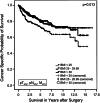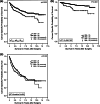Overweight is associated with improved cancer-specific survival in patients with organ-confined renal cell carcinoma
- PMID: 19543914
- PMCID: PMC11844780
- DOI: 10.1007/s00432-009-0616-2
Overweight is associated with improved cancer-specific survival in patients with organ-confined renal cell carcinoma
Abstract
Objectives: Overweight/obesity is known to increase the risk of developing renal cell carcinoma (RCC). However, data on the prognostic impact of overweight in RCC is still conflicting. We assessed whether different body mass index (BMI) levels at the time of surgery had an effect on the long-term prognosis of RCC patients.
Methods: We evaluated 771 patients, with complete information about their BMI, who had undergone renal surgery for RCC between 1990 and 2005 at the authors' institution; the mean follow-up was 5.48 years.
Results: Underweight, normal weight, pre-obesity, and obesity were diagnosed in 4 (0.5%), 239 (31%), 356 (46.2%), and 172 (22.3%) RCC patients, respectively. Overweight (BMI >25) was significantly associated with younger age (P = 0.004) and positive nodal status (P = 0.04) but not with tumor stage, grade, visceral metastasis, gender, histological subtype, or tumor-related symptoms. Overweight patients had a significantly lower risk of cancer-related death; their median 5-year tumor-specific survival rate was 80% as opposed to 72% for patients with a BMI below 25 (P = 0.003). Interestingly, subgroup analysis revealed that the positive association between overweight and survival was even more pronounced in organ-confined (P < 0.001) RCC, but no correlation was observed in advanced disease (P = 0.23).
Conclusion: We were able to identify overweight as an independent prognostic marker of improved tumor-specific survival in patients with organ-confined RCC. Basic research is required to resolve the dilemma of why, if a higher BMI predisposes to RCC, it concurrently prolongs survival after patients have undergone (partial) nephrectomy.
Figures



References
-
- Asal NR, Risser DR, Kadamani S, Geyer JR, Lee ET, Cherng N (1988) Risk factors in renal cell carcinoma: I. Methodology, demographics, tobacco, beverage use, and obesity. Cancer Detect Prev 11:359–377 - PubMed
-
- Calle EE, Rodriguez C, Walker-Thurmond K, Thun MJ (2003) Overweight, obesity, and mortality from cancer in a prospectively studied cohort of U.S. adults. N Engl J Med 348:1625–1638. doi:10.1056/NEJMoa021423 - PubMed
-
- Chow WH, Gridley G, Fraumeni JF Jr, Jarvholm B (2000) Obesity, hypertension, and the risk of kidney cancer in men. N Engl J Med 343:1305–1311. doi:10.1056/NEJM200011023431804 - PubMed
-
- Dhote R, Thiounn N, Debre B, Vidal-Trecan G (2004) Risk factors for adult renal cell carcinoma. Urol Clin North Am 31:237–247. doi:10.1016/j.ucl.2004.01.004 - PubMed
-
- Donat SM, Salzhauer EW, Mitra N, Yanke BV, Snyder ME, Russo P (2006) Impact of body mass index on survival of patients with surgically treated renal cell carcinoma. J Urol 175:46–52. doi:10.1016/S0022-5347(05)00054-6 - PubMed
MeSH terms
LinkOut - more resources
Full Text Sources
Medical

